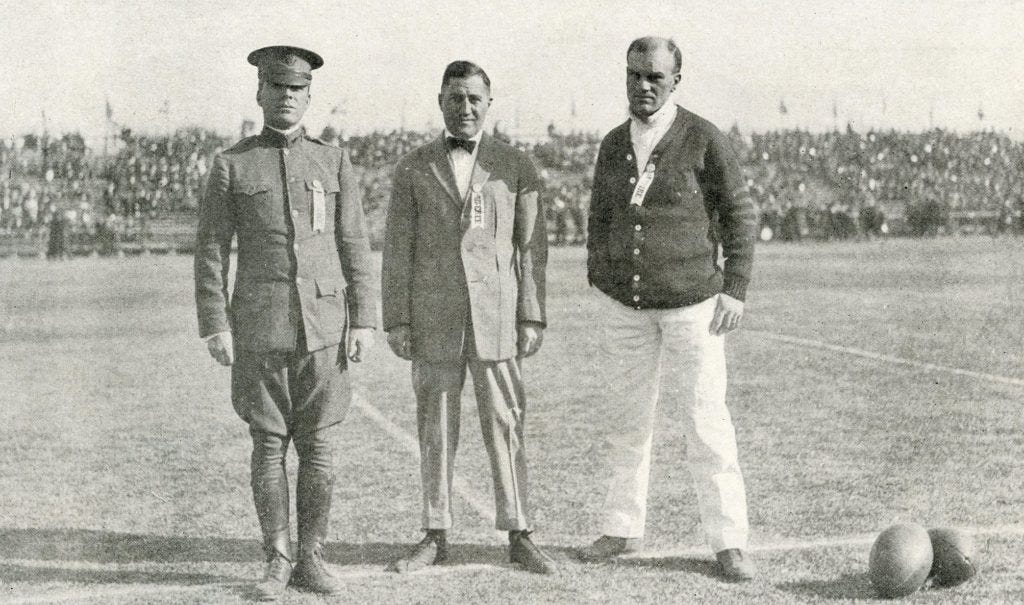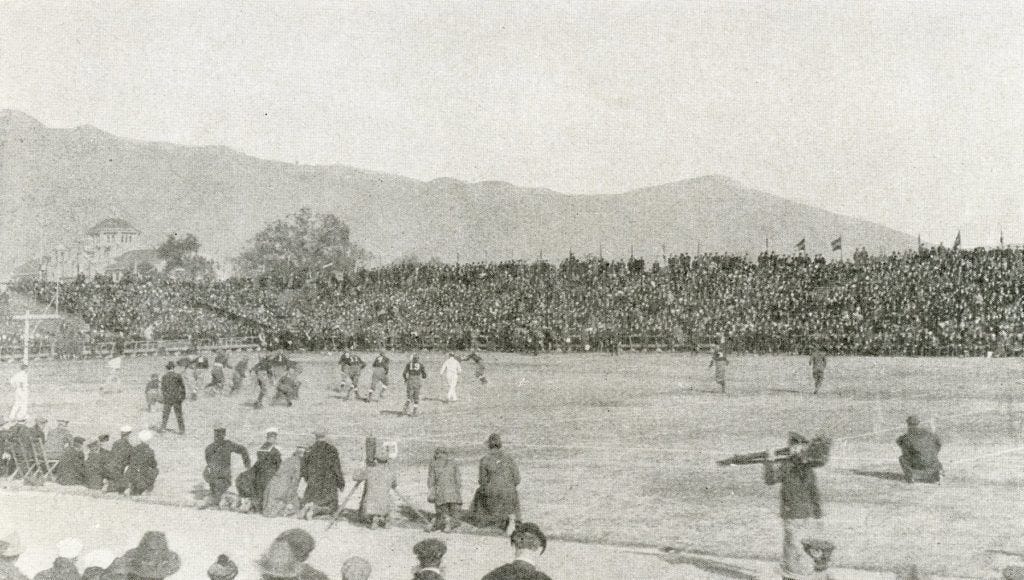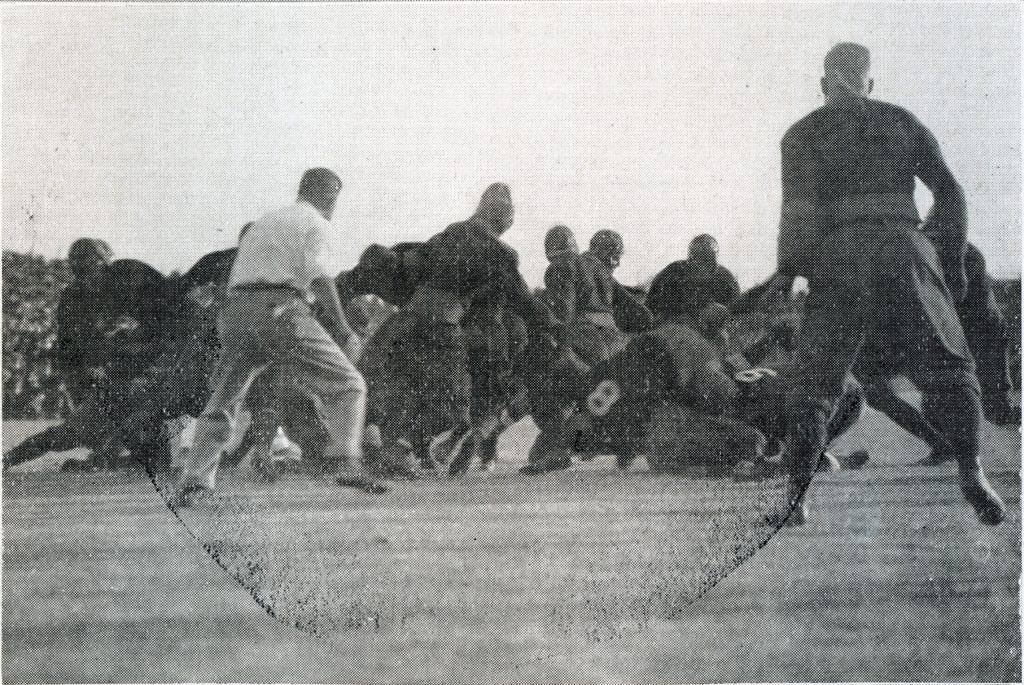Great Lakes defeats Mare Island in the 1919 Rose Bowl
New Year’s Day 1919 provided a beautiful day for football with cool temperatures and a slight breeze. The stands at Tournament Park in Pasadena, the site of the game before the Rose Bowl was built, held 22,000 ticket holders, including 10,000 end-zone seats reserved for service men, while 4,000 others found any available nook and cranny from which to watch the game. The Southern California crowd was particularly eager to see the storied Paddy Driscoll, a Midwesterner they had read about, but never seen in action. At 154 pounds, he had already played in the major leagues with the Chicago Cubs, before joining the Navy and taking over as the Great Lakes quarterback several games into the season. Driscoll would star in the game, but his teammate would earn the MVP award.
Walter Eckersall refereed the game. Eckie was a former All-America player at the University of Chicago and was best known as a sportswriter for the Chicago Tribune. (After refereeing the game, he authored a series of articles about the game and the Great Lakes Bluejackets trip west.) As was then the custom, Eckersell and his fellow officials wore everyday clothes since the first black-and-white striped shirts worn by football officials had not yet been created and would take another decade or two to see widespread use.
The game began with neither team moving the ball well, but Great Lakes gained enough advantage from Paddy Driscoll's punt returns that he attempted, but missed, a dropkicked field goal from the 43-yard line ten minutes into the first quarter.
On the Marines’ first play from the 20-yard line, they gained five yards around left end but fumbled and Great Lakes recovered on the Marines' 25-yard line. Driscoll followed that play by completing a 20-yard pass to George Halas, the Illinois star who later played for the New York Yankees before becoming an NFL legend. The Marine defense toughened, however, and Driscoll was forced to try a second field goal which sailed through the uprights for a 3-0 Great Lakes lead.
Midway through the second quarter, Benton Bangs, the Marines' star running back who was injured in the playoff game on Christmas Day, entered the game for the first time. In a series of runs, Bangs pounded the ball down the field to the 10-yard line, but the Marines inexplicably threw passes the next four plays with all four falling incomplete.
The Marines held the Bluejackets on the next series. After getting the ball back, the Marines lost it during a trick play when Con Ecklund, a Great Lakes tackle, grabbed the ball and rumbled forty yards to set up the first touchdown of the game, a three-yard run by Blondy Reeves.
The Marines received the kick, failed to move the ball, and punted once again. On the Jackies’ first play, Reeves fumbled and Mare Island recovered the ball on the Great Lakes 30-yard line. Bangs quickly threw to Mohr for a 20-yard gain. At the ten and threatening to score near the end of the half, Bangs threw an incomplete pass that ball rolled over the goal line, resulting in a touchback. (Until 1938, incomplete passes in which the ball crossed the goal line resulted in a touchback.) That play ended Mare Island's second scoring threat and the halftime came with Great Lakes leading 10-0.
Early in the second half the Jackies intercepted Mare Island at midfield, which was quickly followed by Driscoll throwing a 20-yard pass to end, Dick Reichle. (A few years later Reichle gained notoriety by smacking the second home run ever hit in newly-opened Yankee Stadium. Babe Ruth hit the first.) On the next play, Driscoll tossed a 30-yarder to his other end, George Halas, who dove over the goal line near the right sideline for Great Lakes’ second touchdown. With the extra point, Great Lakes took a 17-0 lead.
Mare Island threatened to score once again in the fourth quarter, but the pass was intercepted inside the 10-yard line by Halas. Halas headed toward a pick six only to be caught from behind at the 3-yard line. For the rest of this life, Halas regretted not diving into the end zone, particularly because the Marines’ defense kept Great Lakes out of the end zone the next four plays.
The game ended in a 17-0 Great Lakes victory. In the end, the Marines’ failure to stick with the run game cost them whatever chance they had to win. George Halas was the game’s Most Valuable Player, though he thought Driscoll earned the award.
The Jackies’ victory in the 1919 Rose Bowl also brought to a close the brief service Rose Bowl era, a period in which teams from the military training camps appeared in successive Rose Bowls. Never before or since have service teams played such a dominant role in American sports. Training camp teams were highly rated during WWII as well, but none matched the regular season performance of Great Lakes and Mare Island and their eventual meeting in the Granddaddy of Them All.
Click here for options on how to support this site beyond a free subscription.





